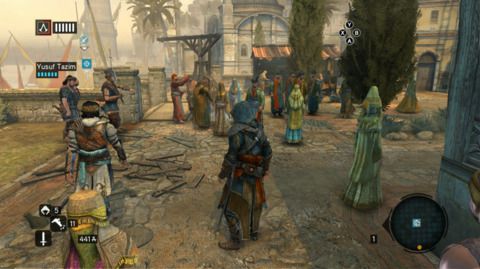
Assassin’s Creed Revelations isn’t a bad game. In some ways it is the best of the first four mainline console entries in the series, with impressive graphics, the best controls of the first two games, and a refinement of all the systems those games have introduced along with some new mechanics (chiefly the bomb crafting) that aren’t incredibly compelling but don’t detract from the experience. The Istanbul setting is impressive and interesting, giving the game a very different feel from the first two Ezio adventures, while not retreading Altair’s adventure either (except for those brief moments when the game literally retreads Altair’s adventure.)
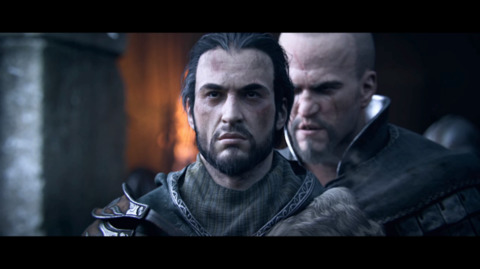
On the other hand, Assassin’s Creed: Revelations feels like a game sewn together from a bunch of different parts. Given the number of studios that worked on it this isn’t surprising; It’s likely that at least some of the teams were off on their own, making independent levels or sections of the game that were put together in the final phase of development. This is not an uncommon way for big companies to make games, but most AAA games do a better job of integrating their parts. The Assassin’s Creed series, on the other hand, seems more prone to showing its seams, possibly because of the quick turnaround between games. That doesn’t mean Revelations is a bad game; it has a lot of interesting and engaging elements, but it isn’t cohesive. Playing through this series back to back has really shown me just how rushed and rough at the edges these games are, and given me a better understanding of both the series fans and detractors. I can appreciate the series’ intricate worlds, sweeping narratives, and good enough mechanics, but I also get frustrated by the paper thin side content, bloated mechanics, and shoddy storytelling and characters. Assassin’s Creed games tend to have peaks and valleys and openly display their rushed development.
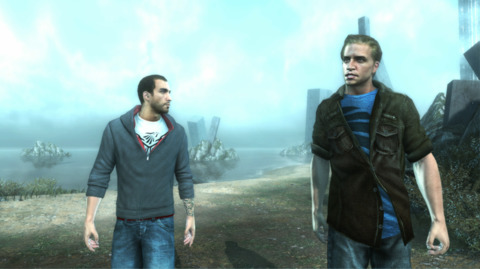
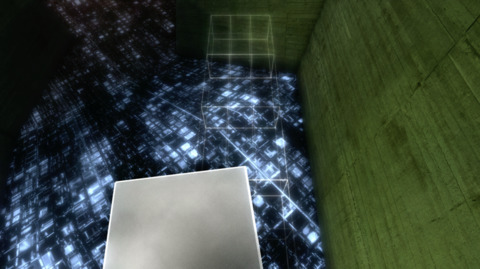
AC Revelations opens with Desmond, who has yet another character model that only vaguely looks like the previous ones, stuck in the animus after his mind fragments. There he meets Subject 16, who has been sending him coded messages in the previous games, and tells Desmond he has to put his brain back together before he goes insane and the animus wipes him out. It’s an intriguing premise that the game does almost nothing with, and it serves mostly to introduce Subject 16, a character whose entire arc is that you don’t quite know his motives until the very end. I guess it also saves development time and money on the Desmond sequences, which now feature voice acting from the other characters talking about Desmond but no locations or animation outside the small island Desmond is on, Desmond, and Subject 16. Despite being called Revelations the game does basically nothing to advance the Desmond plot, and while there are some actual playable segments as Desmond they are optional and take the form of 5 first person platforming puzzle levels. In these Desmond recounts his past in voice over while you platform through abstract levels where you can spawn platforms to stand on and have to overcome various obstacles. These levels aren’t that bad; they’re sort of like something you’d find in a decent but forgettable indie game from the late Xbox Live Arcade era, but they’re completely divorced from the main part of the game both in play style and theme. Desmond’s voice over is decently written but tells you almost nothing you didn’t already know about the character and pretty much ignores what’s happened in the series so far, focusing instead on Desmond before Abstergo abducted him. It really feels like something from another game just bolted onto Revelations, and the only reason I can think of for doing it this way is that it was easy to have another studio work on these levels while most of the team worked on the main game.
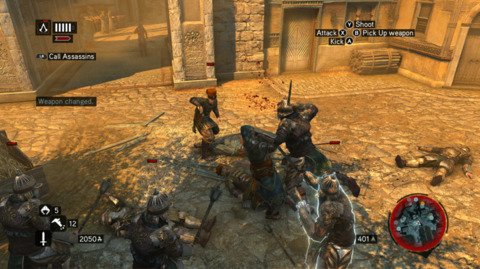
Ezio’s part of Revelations also starts a little strangely. We’ve flashed forward about 20 years and Ezio is in his 50s, though just as spry as ever, and has come to Altair’s old home base of Masyaf in pursuit of his library, only to find the Templars have gotten there first. The first level then plays out as a long, linear, mission, where Ezio climbs, fights, and stealths his way through Masyaf to try and get back a key to Altair’s library. The gameplay is like the previous Assassin’s Creed games, though with larger characters and better feeling combat, but the linear level design makes it feel almost like a God of War (pre-2018) style linear action game with some stealth elements. It doesn’t really feel like Assassin’s Creed and while I thought it was fine I was wondering whether the game would even have an open world or the mechanics of the previous games.
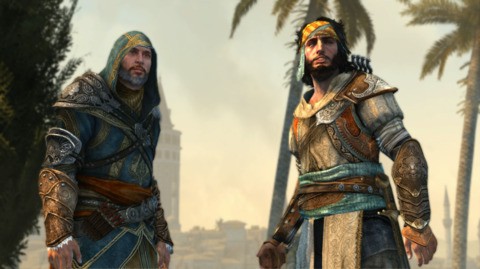
It does. After the first level Ezio arrives in Constantinople and the game opens up like prior Assassin’s Creed games, with viewpoints to scale, towers to free, assassins to recruit, and all the rest of the trimmings. If Assassin’s Creed Brotherhood felt like it was built out of spare parts left over from AC II, Assassin’s Creed Revelations doesn’t feel at all like the prior two games in the sub series, at least aesthetically. Constantinople is detailed and colorful, with narrow winding streets and minarets towering over the rooftops. We’re clearly far from Venice or Rome and at first it seems like a nice change of pace, as Ezio meets the assassins of his new city and gets caught up in intrigue surrounding the newly formed Ottoman Empire. As the game unfolds, however, it becomes clear that not only is Ezio far from his prior home, he seems to have no interest in it or anyone from there, except for his sister who he writes letters to during loading screens in between the sequences. Anyone hoping for resolution with any of the side characters from the prior two games will get none at all, because Revelations has zero interest in Ezio’s prior adventures. It’s a weird choice for a game that caps off a sub-trilogy, especially considering how Brotherhood relied almost entirely on characters from AC II in filling out Ezio’s cast of allies. In Revelations Ezio has only the Istanbul assassin’s guild, a royal prince he meets randomly on the ship that brings him to the city, and a woman I’ll be talking more about a little later.
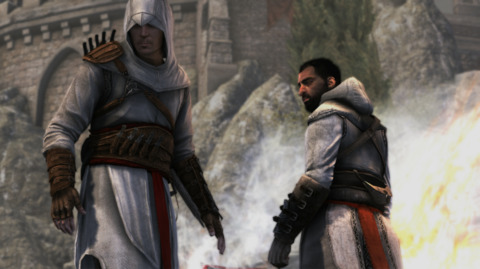
Of course Revelations purports to be about more than just Ezio’s story. It also brings back Altair, the protagonist of the first game (and the Bloodlines PSP game.) However, “brings back” is a bit of an overstatement. Instead I would say he makes a few fleeting appearances in short levels set exclusively at Masayf, where we see him at various points during his life, mostly towards the end. I don’t know if the original design document called for more Altair and they ran out of time and money to implement him or what, but these sequences are extremely unsatisfying. They’re short, mechanically boring, and hint at deep changes within Altair that we never experience. Ezio is able to view these sequences by accessing the keys to Altair’s library, showing that animus technology seems to predate Abstergo’s creation of the animus, which doesn’t seem of interest to anybody, and creates a weird memory within a memory situation where you’re playing Desmond remembering Ezio reliving Altair’s memories, which also isn’t of interest to anyone. Regardless, these are only glimpses into Altair’s life, they’re all focused around Masayf, and while in theory seeing Altair with a wife and son would be interesting, the fleeting glimpses offered don’t amount to much and are not fun to play.
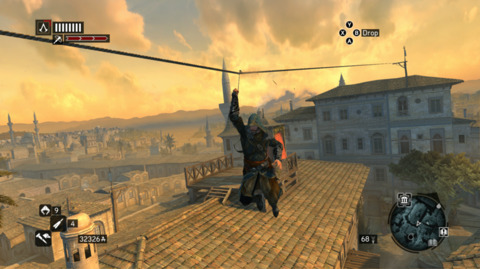
While the Ezio story is very different from the prior two games, and they’ve clearly changed the graphical style substantially (perhaps a new engine?) the gameplay changes are mostly insignificant. Ezio receives a hookblade after he gets to Istanbul, which allows him to reach out and try to grab ledges and would, in theory, make the free running more interactive but really doesn’t change things much. Horseback riding has been removed from the game and the assassin management minigames have been expanded. Istanbul has towers to capture, just like Rome did, but they no longer feel like the area around them was designed to make an assault interesting and instead feel more like they were placed randomly throughout the city. After a tower is captured and you have leveled up an assassin sufficiently you can assign one of your assassin flunkies to be the leader of that “den” and then do some mastery missions with them to complete the process. This locks the tower from the Templars attempting to recapture it, which is something that apparently can happen in the game but did not once during my playthrough except for the tutorial mission about the mechanics of defending a tower (surprise, it’s a crappy tower defense minigame.) I think it might relate to notoriety, which in this game can only be lowered by bribing heralds or assassinating witnesses (there are no posters to tear down) and which I mostly kept from getting out of control, but I honestly don’t know and don’t really care. The notoriety system is a pain because the game features a shop buying mechanic similar to Brotherhood’s, only buying a shop fills a quarter of your notoriety meter, meaning that if you want to buy shops and build passive income you need to constantly be bribing heralds or finding the very occasional witness to assassinate, and it just adds to the chore-like feeling that the Assassin’s Creed series is infested with. Is it supposed to be a fun mechanic that if I want to buy a shop I also have to find a random herald to bribe? I have no idea how. It just feels like senseless padding.
The missions to lock down the towers are at least interesting in conception, especially because Ezio doesn’t perform the final assassination. Instead his disciples do it. If the game spent more time fleshing out Ezio as the mentor and leader of the assassins it might have something interesting to say.
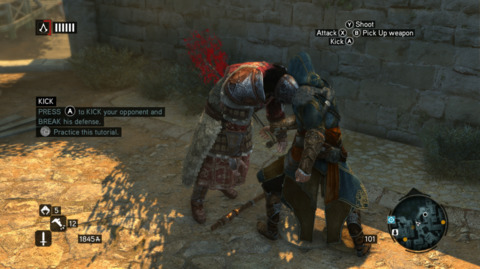
But it doesn’t. Instead Revelations is a thematic mess. It’s the last Ezio game but shows no interest in the Ezio of the last two games, recasting him as a tired man towards the end of middle age who is ready to put down the wristblade and give up a life of killing. This might be an interesting take if it were connected to what he did in the previous games, but with no returning characters or themes it just feels like a generic “I’m too old for this shit” type character, and I questioned whether the game was designed with Ezio in mind at all. And despite Ezio being tired of killing, he does a hell of a lot of it in this game. He murders people with brutal animations and by the truckload. The game tries to raise some of the moral implications of this by having one of the guys you assassinate be a good guy after all, but all it does is create massive ludonarrative dissonance with the rest of what Ezio does. He starts a riot among poor shopkeepers to create a distraction, causing dozens of them to be killed by the guards. He murders guards by the dozen, even though they aren’t necessarily templars and are sometimes working for his allies. He starts a fire that kills a lot of civilians. Even as he questions his life of violence he’s more violent and brutal than he has ever been before, and with much lower personal stakes.

This extreme violence also damages the other aspect of Ezio’s story, his romance with Sofia, an Italian scholar who helps him find Altair’s keys by translating books. This plot is part of the main story but seems like it might have initially been conceived of as a side activity, since her missions have a different icon on the map than other story missions and feel more like the tombs and dens of the prior two games. Ezio worries about his attachment to Sofia, about her safety if she’s with him, and about what she will think if she knows who he truly is. All his worries come to pass, but she has zero real reaction to the chaos and bloodshed he brings into her life. It’s jarring and weird and again the mechanics undercut the story. Sofia should react with horror at what she sees Ezio do. A smarter game would grapple with this. Revelations just glosses it over.
There are no real revelations in Revelations. The end does offer some additional information about the forerunners and what they were doing, but it’s just more cliffhanger stuff. Altair’s story is a tiny part of the game, Ezio’s tale comes to a conclusion but one that isn’t satisfying because it has no relationship to the prior games in the series, and Desmond’s story is stuck in neutral the whole time. Four games into the series this is how Assassin’s Creed games work, narratively. The modern stuff is an endless soap opera, and the past narratives are never fully satisfying on their own. This would be fine if the gameplay were more engaging, but so much time is spent following people in boring stealth sequences and the mission designs are so mediocre that the games feel unambitious (and are very unpolished.) Revelations maps are fine, though Istanbul can be annoying to navigate with lots of unscalable walls in the middle of the map and the two parts of the city split by a river you need to fast travel or take a boat ride to cross. Missions that take you away from the main Istanbul, whether it’s a brief trip to a smaller open map late in the game or Sofia’s missions taking you to the Uncharted style Den levels create some variety but aren’t as good as similar missions in AC II or Brotherhood. There’s nothing on the level of Leonardo’s weapons or the Assassin’s tombs.
People who’ve played the game might notice that I haven’t even mentioned the game’s biggest gameplay change, the introduction of bombs and crafting. Ezio can craft a bunch of different bombs to distract or kill guards, including effects like smoke and poison or noisemakers etc… In theory this should open up more stealth opportunities, but the environments and missions aren’t well designed for bombs to be useful, and they aren’t necessary to get through the game. It’s the kind of addition that Assassin’s Creed specializes in. A feature for the back of the box without many real gameplay implications.
It may sound like I strongly disliked Assassin’s Creed Revelations, but I didn’t. The game is…fine. I really liked the graphical overhaul. Istanbul is aesthetically interesting and very different from what the game has done before. The story was mediocre but not offensively bad, and the game is relatively short for an Assassin’s Creed game, so it doesn’t outstay it’s welcome. It’s not a bad game, just an unnecessary one, and one with a lot of squandered potential. I will say that the version I played (The Ezio Collection version on an Xbox One X) was a technical mess and crashed on me more than any Xbox game I can remember. I don’t know if that’s unique to this version, but it was pretty frustrating and I thought about stopping the game because of it. It just adds to the overall feeling of being rushed and slapshod.
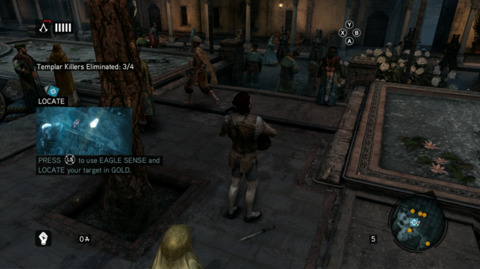
Four games in the Assassin’s Creed series is just spinning its wheels. Playing all these games within a span of a month is definitely a bad idea, because they don’t really evolve from title to title and the story isn’t compelling enough to keep things interesting. I can understand why fans who played one a year would have had a better experience, but even then I think the series would be much better if it took more time between entries and did more to differentiate them. I really enjoyed the ACII version of Ezio, and the ACB and ACR versions are fine, but he’s not one of my favorite characters in gaming and is nowhere near the level of a Nathan Drake or even Kratos.
It’s frustrating to see the Assassin’s Creed series repeatedly get most of the way to being really good, and be satisfied with that. Ubisoft clearly cared more about pumping these games out than it did about making the franchise great. The culmination of that attitude can be seen even more clearly in Assassin’s Creed III, but it was already pretty evident by Revelations.
Log in to comment